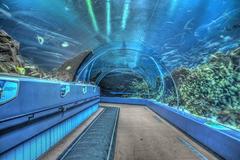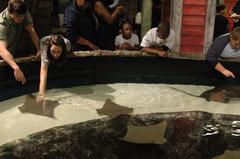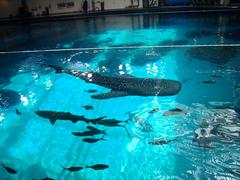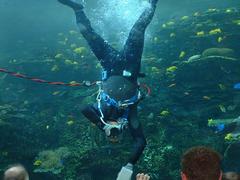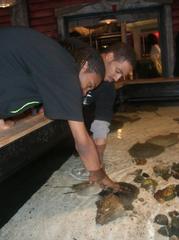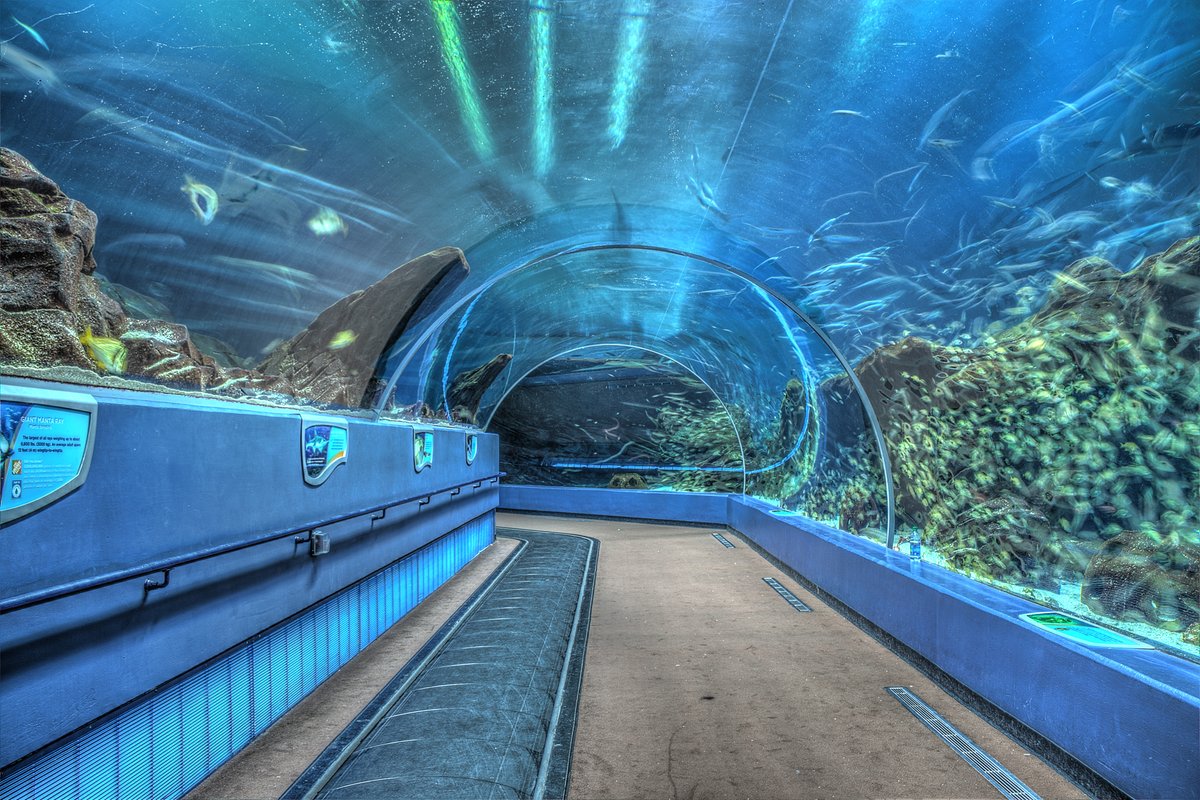
Visiting Georgia Aquarium: Hours, Tickets, and Tips
Published Date: 16/07/2024
Why Visit the Georgia Aquarium
The Georgia Aquarium in Atlanta, Georgia, is one of the most impressive and expansive aquariums globally, offering a unique blend of entertainment, education, and conservation. Since its grand opening on November 23, 2005, the Georgia Aquarium has become a significant attraction, drawing millions of visitors annually. This monumental facility was made possible through a generous $250 million donation from Bernard Marcus, co-founder of The Home Depot, who envisioned the aquarium as a gift to the community and a global landmark (Georgia Aquarium History).
The aquarium’s architectural design is a marvel in itself, featuring a 600,000 square feet facility that houses over 10 million gallons of both fresh and saltwater. Its exterior resembles a colossal ship breaking through waves, and its interior showcases interconnected galleries mimicking various aquatic environments, providing a visually stunning and immersive experience (Architectural Digest).
One of the aquarium’s standout features is the Ocean Voyager exhibit, which initially helped the Georgia Aquarium hold the title of the world’s largest aquarium until 2012. The Ocean Voyager contains 6.3 million gallons of water and is home to whale sharks, featuring a 100-foot-long underwater tunnel and a 23-foot-tall viewing window, offering visitors an unparalleled view of marine life (Ocean Voyager).
The Georgia Aquarium is more than just an attraction; it is a hub for marine conservation and research, operating a state-of-the-art veterinary hospital and research center. It collaborates with global institutions to protect endangered species like the African penguin and beluga whale (Conservation Efforts). The aquarium also places a strong emphasis on educational outreach, offering interactive exhibits, behind-the-scenes tours, and hands-on activities to foster future marine biologists and conservationists (Educational Programs).
Table of Contents
- Introduction
- Best Time to Visit
- Ticketing and Admission
- Accessibility
- Parking and Transportation
- Dining Options
- Exhibits and Attractions
- Special Experiences
- Educational Programs
- Conservation and Research
- Visitor Etiquette
- Souvenirs and Gift Shops
- Nearby Attractions and Travel Tips
- Conclusion
- FAQs
- Stay Updated
Ultimate Guide to the Georgia Aquarium - Visiting Hours, Tickets, and Must-See Attractions
Introduction
The Georgia Aquarium, located in Atlanta, Georgia, is not just one of the largest aquariums in the world but a cornerstone of marine conservation, education, and research. Since its grand opening in 2005, the aquarium has drawn millions of visitors, offering them an immersive experience into the wonders of the aquatic world.
Origins and Development
The Georgia Aquarium owes its existence to a generous $250 million donation from Bernard Marcus, co-founder of The Home Depot. Marcus envisioned the aquarium as a gift to the community and an iconic global attraction. The construction was a monumental effort, requiring over 2,000 workers and 27 months to complete (Georgia Aquarium History).
Architectural Marvel
The design of the Georgia Aquarium is awe-inspiring, featuring a 600,000 square feet facility that houses over 10 million gallons of both fresh and saltwater. Its exterior resembles a giant ship breaking through waves, while the interior showcases interconnected galleries mimicking various aquatic environments (Architectural Digest).
Record-Breaking Exhibits
Initially, the Georgia Aquarium held the title of the world’s largest aquarium until 2012. One of its standout features is the Ocean Voyager exhibit, containing 6.3 million gallons of water and home to whale sharks. It includes a 100-foot-long underwater tunnel and a 23-foot-tall viewing window, providing an immersive experience (Ocean Voyager).
Visitor Information
Visiting Hours - The Georgia Aquarium is open daily, but hours vary. Check the official website for current visiting hours.
Tickets - Ticket prices range from $35 to $45, with discounts available for children, seniors, and military personnel. Purchase tickets online for the best rates and to avoid long lines (Georgia Aquarium Tickets).
Travel Tips
Plan your visit during weekdays or early mornings to avoid crowds. Consider purchasing a CityPASS for discounted entry to multiple Atlanta attractions. Parking is available on-site, and the aquarium is accessible by public transportation.
Nearby Attractions
While in Atlanta, explore nearby attractions like the World of Coca-Cola, Centennial Olympic Park, and the Atlanta Botanical Garden. These sites offer additional cultural and recreational experiences.
Conservation and Research
The Georgia Aquarium is committed to marine conservation and research, operating a state-of-the-art veterinary hospital and research center. It collaborates with global institutions to protect endangered species like the African penguin and beluga whale (Conservation Efforts).
Educational Outreach
Education is a key mission of the Georgia Aquarium. The facility offers interactive exhibits, behind-the-scenes tours, and hands-on activities. Partnerships with local schools provide specialized programs, fostering future marine biologists and conservationists (Educational Programs).
Economic Impact
Since its opening, the Georgia Aquarium has significantly boosted Atlanta’s economy, generating revenue and creating jobs. Its success has led to further investments in the city’s tourism infrastructure (Economic Impact Study).
Cultural Significance
The Georgia Aquarium is a cultural landmark, reflecting Atlanta’s dedication to innovation, education, and conservation. It hosts high-profile events and has been featured in various media, solidifying its status as a world-renowned institution (Cultural Significance).
Future Prospects
The Georgia Aquarium continues to innovate with plans for new exhibits, including a state-of-the-art shark gallery set to open in 2024. Investments in new technologies like augmented reality promise to enhance visitor experiences (Future Plans).
Community Engagement
Deeply rooted in the local community, the aquarium offers programs like free admission days and partnerships with local non-profits. Annual events like the “Aqua Vino” wine tasting fundraiser support its conservation and education missions.
Conclusion
The Georgia Aquarium is much more than an attraction; it is a hub of education, conservation, and community engagement. Whether you’re a local or a visitor, a trip to the Georgia Aquarium offers a unique opportunity to explore the wonders of the aquatic world while supporting vital conservation efforts.
FAQ
Q - What are the Georgia Aquarium visiting hours?
A - The visiting hours vary by day. It’s best to check the official website for the most up-to-date information.
Q - How much do tickets to the Georgia Aquarium cost?
A - Ticket prices range from $35 to $45, with discounts for children, seniors, and military personnel. Online purchase is recommended for the best rates.
Q - What are some nearby attractions?
A - Nearby attractions include the World of Coca-Cola, Centennial Olympic Park, and the Atlanta Botanical Garden.
Q - Is there parking available?
A - Yes, parking is available on-site, and the aquarium is also accessible by public transportation.
Q - What conservation efforts is the Georgia Aquarium involved in?
A - The Georgia Aquarium collaborates with global institutions to protect endangered species like the African penguin and beluga whale, among others.
Call to Action
Stay updated with the latest news and events from the Georgia Aquarium by following them on social media, downloading their mobile app, or checking out related posts on our website.
